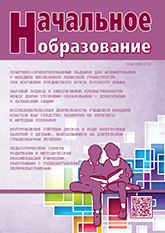Russian Federation
CSCSTI 14.15
CSCSTI 14.25
The article reveals the goals and methods of organizing the differential education of primary schoolchildren in mathematics, which involves taking into account the individuality, level of ability and degree of independence of each schoolchild, as well as providing him with timely assistance in case of difficulties. Methods of differentiation and means of assisting students are described, which are used by the teacher in the classroom to solve various types of arithmetic problems. The effectiveness of a differentiated approach to the formation of mathematical literacy of primary schoolchildren is emphasized, which makes it possible to guarantee compliance with the requirements of the Federal State Educational Standard of Primary General Education with the planned learning outcomes.
primary schoolchildren; the formation of mathematical literacy; the effectiveness of the differentiated approach; methods and techniques of differentiation; schoolchild’s degree of independence; methods of assistance; achievement of planned learning outcomes
1. Abasov Z. Differenciaciya obucheniya: sushchnost' i formy [Differentiation of education: essence and form]. Direktor shkoly [School Director]. 1999, I. 8, pp. 60-66. EDN: https://elibrary.ru/UJAIVL
2. Mal'ceva E.V. Ispol'zovanie differencirovannogo podhoda na urokah matematiki v nachal'noj shkole [Using a differentiated approach in mathematics in elementary school]. Vestnik Marijskogo gosudarstvennogo universiteta [Bulletin of Mari State University]. 2013, I. 11, pp. 62-65. EDN: https://elibrary.ru/RDCNEP
3. Barinova O.V. Differencirovannoe obuchenie resheniyu matematicheskih zadach [Differentiated training in solving mathematical problems]. Nachal'naya shkola [Elementary School]. 1999, I. 2, pp. 41-44.
4. Kovalyova G.S. O mezhdunarodnoj programme PISA-2009 i odnom iz rezul'tatov po kriteriyam: matematicheskaya i estestvenno-nauchnaya gramotnost' [About the international program PISA-2009 and one of the results by the criteria: mathematical and science literacy]. Municipal'noe obrazovanie: innovacii i eksperiment [Municipal formation: innovations and experiment]. 2011, I. 1, pp. 3-10. EDN: https://elibrary.ru/NUDNPP
5. Osmolovskaya I.M. Differenciaciya obucheniya: za i protiv [Differentiation of education: pros and cons]. Shkol'nye tekhnologii [School technologies]. 2001, I. 6, pp. 16-18.
6. Federal'nyj gosudarstvennyj obrazovatel'nyj standart nachal'nogo obshchego obrazovaniya [Federal state educational standard of elementary general education]. utv. Prikazom Ministerstva obrazovaniya i nauki RF ot 06.10.2009 № 373 [approved. By the order of the Ministry of Education and Science of the Russian Federation of 06.10.2009 No. 373]. Available at: http://www.consultant.ru/cons/cgi/online.cgi?req=doc&base=LAW&n=193503&fld=134&dst=100009,0&rnd=0.21526900876348964#033370294312481175 (accessed 25 November 2019).
7. Funkcional'naya gramotnost' mladshego shkol'nika. Didakticheskoe soprovozhdenie [Functional literacy of a primary school student. Didactic accompaniment]. Moscow: Ventana-Graf Publ., 2018. 228 p.






